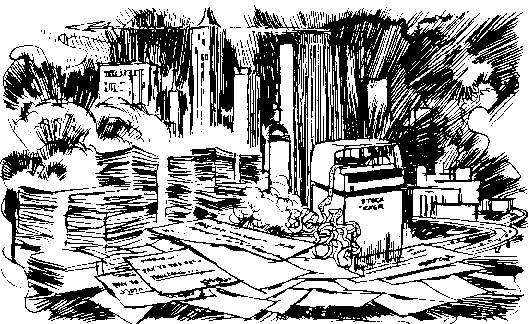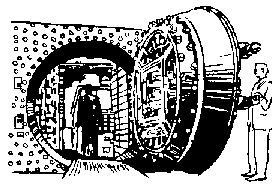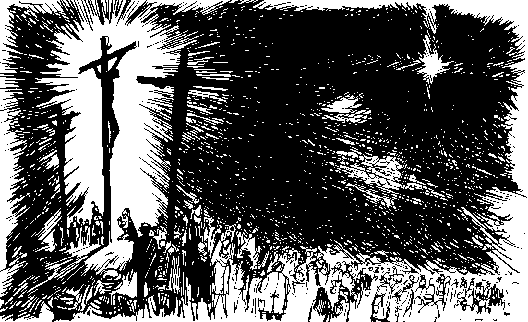Justification by Faith and the Current Religious Scene
PART 4
Spiritual Capitalism
Power is an important word in the religious world as well as in the
business world. We hear a lot about power from those who are promoting
revival, renewal or Pentecostalism. It is said that Christians today
need spiritual power within them so that they can turn the world upside
down for Christ.
Now I believe in the power of "Christ within," or the power
of the indwelling Spirit. But I submit that our faith needs to be
in something bigger than an internal experience before we shall see
a revival of apostolic power.
Let me illustrate my point from the world of business and economics.
If a businessman aspires to power in the world of business, he needs
something more than personal inward resources such as brains, money
and executive ability. These are important of course, but he needs
the help of resources outside himself. If he has only his own inward
strength and money to work for him, he is greatly limited. He needs
the strength of another's capital. We call it credit. A proper use
of credit is the businessman's greatest skill. Credit is power.
How did the great business tycoons manage to rise from nowhere and
build a financial empire? By a skillful use of the resources of others!
If they had merely worked on resources within their own head, their
own muscles and their own banking account, you would never have heard
of their success stories. None of them could rise to power without
credit. They not only got their own resources to work for them, but
other people's resources. We call this method capitalism.
 Capitalism and the Reformation Capitalism and the Reformation
Max Weber and other scholars have observed that there is a relation
between the Protestant Reformation and the rise of modern capitalism.
I would like to point out one interesting parallel. Capitalism cannot
exist without credit, and Protestantism cannot exist without imputed
righteousness. When men learned how to use credit and put it to
work for them, capitalism was born. When men learned how Christ's
righteousness was credited (imputed) to the believer, Protestantism
was born.
In fact, there even appears to be evidence that the Protestant awakening
brought light and progress on many fronts—not the least an economic
awakening. Economic progress followed in the wake of the Reformation.
In every country Protestants became the nation's merchants. The
Protestant nations became the most prosperous.
It is written in the Bible that Jacob had power with God. That is
the greatest power a man can have. The medieval church tried to
obtain power with God on the basis of an inward infusion of righteousness.
Men looked inwardly, thinking that this was their only means of
spiritual power. Economic practices were not much more enlightened.
Men traded with "real" money such as gold, goods and perhaps
services. It was very close to, if not very often, a real barter
system.
 The New Thinking The New Thinking
The Reformation taught men to think differently. They rediscovered
the Pauline principle of imputed righteousness. They saw that Christ
had provided for man an infinite fund of moral power. God has made
its use dependent upon faith. As soon as the sinner believes in
the doing and dying of Christ, God places the righteousness of His
Son to the sinner's account in the bank of heaven. The righteousness
of Christ is the sum total of God's righteousness (Rom. 3:21, 22;
2 Cor. 5:21). No man could contain it all within himself anymore
than he could carry away a billion dollar bills in a couple of suitcases.
Yet God gives all of Christ's omnipotent righteousness to the believer,
and the way He does it is by imputation. With all these resources
to his credit, the believer has some real power behind him. One
great aspect of the Holy Spirit's power is to give the Christian
wisdom to use and depend upon that infinite credit. The power of
imputed righteousness is the sum total of the power of Christ's
life. Think about it!
Imagine a struggling businessman, hemmed in by lack of capital,
with all his inward resources at the stretch, going in to see the
Bank of America for help. The president tells him, "You can
have to your credit all the money of this great bank. Here's the
check book. Use our name." That man might not walk around with
the exhilarating sense of inward power (for in himself his resources
are very limited), but he would have a vast appreciation of the
power in the name and credit of Bank of America.
Paper Money and Paper Transactions
It is amazing how Protestants are now showing so little appreciation
for the pre-eminent importance of imputed righteousness. Yet it
was this concept that gave birth to the Reformation. If it dies
out, Protestantism will die out.
The Roman Catholic Church has shown nothing but contempt for the
Protestant doctrine of imputed righteousness. They call it a weak,
unreal, "as if" righteousness. They never cease to marvel
that Protestants can see any virtue in a righteousness wholly outside
the believer. In contrast, they contend that a man is justified
before God by a "real," "transforming," "inward"
righteousness. Imputed righteousness sounds too much like "pie
in the sky" for the realistic Catholic mind, so they prefer
to talk about an infused righteousness which is substantially inside
the believer's heart. Most Protestants today are really thinking
like Catholics rather than Protestants. They are doing it without
realizing it. All the concentration is on the power of an inner
experience of some sort.
I remember talking to a Christian friend of mine who seemed to express
the generally low estimate this age has on imputed righteousness.
My friend said, "Imputed righteousness is just like paper money.
It's better to possess the real McCoy. Imputed righteousness is
only a paper transaction. It's much better to have the real inward
experience."
I replied to him, "Bob, you would want to work on better principles
than that if you should ever aspire to rise to the top in the business
world. You disparage paper transactions and think that dealing with
'real' currency is better. That's like the little corner store which
has the notice displayed above the counter, saying, 'We buy for
cash, and we sell for cash.' That is why it remains a little corner
store. But how is all the really big business transacted—business
that controls the flow of multimillions of dollars, thousands of
men, resources of great business empires which belt the world? By
'paper transactions' if you please! Big business is accomplished
by legal, paper transactions! When the big corporation needs a vast
amount of capital to carry on, it gets some credit. The bank merely
writes down something on a piece of paper. That corporation acts
on the faith of that paper transaction, and things really happen.
So if Christians are going to have power to turn the world upside
down, they need a lot of credit. It is freely available if they
only have faith to apply for it and faith to act on it."
 "As
If" Righteousness "As
If" Righteousness
Let us call the doctrine of imputation "divine credit" — for that is what it is. This credit not only gives us power to
act; it gives God power to act. Let us see this in the light of
the great transaction of atonement.
Our sins were imputed to Christ. This did not make Christ a sinner,
but He was regarded as a sinner. Imputation does not change the
object; it changes the way the object is regarded. Now although
Jesus was in Himself perfectly righteous and pleasing to God, the
imputation of our sins to Him made Him appear as if He were a sinner
and abhorrent in the sight of God. This was no make believe with
God. God treated His Son, not on the basis of what He was in Himself,
but on the basis of what He was by imputation. The sword of divine
justice was unsheathed upon Him, and He died cursed, rejected and
condemned by the guilt of the world's sin.
On the basis of this atonement, God can now be just and at the same time impute (credit) the sinless life of Christ to the believer (Rom. 3:26). Although he is sinful in himself and abhorrent to the holiness of God, the imputation of Christ's righteousness to the believer makes him appear before God as if he were as righteous as Jesus. This is no make believe with God. God is now able, without any compromise to justice, to treat this sinner as if he were righteous. He gives him the gift and infilling of the Spirit, the ministry of angels, the protection of His law, the seal of sonship, and all the resources of heaven to his aid. The believer may not always live, feeling like he has some exhilarating power within him. In fact, he often feels quite desperately empty and sinfully weak. But being satisfied that Christ stands surety for him, he proceeds to act by faith in his credit with the bank of heaven. As he steps out in faith to obey God and to resist sin, he finds that he "can do all things through Christ which strengtheneth" him.
Christ's righteousness is not imputed to us to release us from the necessity of moral and ethical action but to give us all the rights and titles to act as sons of God — or as Paul says, "that the righteousness of the law might be fulfilled in us, who walk not after the flesh, but after the Spirit" (Rom. 8:4). |
 Capitalism and the Reformation
Capitalism and the Reformation The New Thinking
The New Thinking "As
If" Righteousness
"As
If" Righteousness